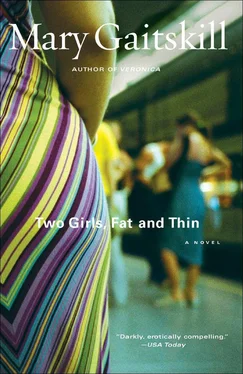Mary Gaitskill - Two Girls, Fat and Thin
Здесь есть возможность читать онлайн «Mary Gaitskill - Two Girls, Fat and Thin» весь текст электронной книги совершенно бесплатно (целиком полную версию без сокращений). В некоторых случаях можно слушать аудио, скачать через торрент в формате fb2 и присутствует краткое содержание. Год выпуска: 2012, Издательство: Simon & Schuster, Жанр: Современная проза, на английском языке. Описание произведения, (предисловие) а так же отзывы посетителей доступны на портале библиотеки ЛибКат.
- Название:Two Girls, Fat and Thin
- Автор:
- Издательство:Simon & Schuster
- Жанр:
- Год:2012
- ISBN:нет данных
- Рейтинг книги:5 / 5. Голосов: 1
-
Избранное:Добавить в избранное
- Отзывы:
-
Ваша оценка:
- 100
- 1
- 2
- 3
- 4
- 5
Two Girls, Fat and Thin: краткое содержание, описание и аннотация
Предлагаем к чтению аннотацию, описание, краткое содержание или предисловие (зависит от того, что написал сам автор книги «Two Girls, Fat and Thin»). Если вы не нашли необходимую информацию о книге — напишите в комментариях, мы постараемся отыскать её.
Review) create a haunting and unforgettable journey into the dark side of contemporary life and the deepest recesses of the soul.
Two Girls, Fat and Thin — читать онлайн бесплатно полную книгу (весь текст) целиком
Ниже представлен текст книги, разбитый по страницам. Система сохранения места последней прочитанной страницы, позволяет с удобством читать онлайн бесплатно книгу «Two Girls, Fat and Thin», без необходимости каждый раз заново искать на чём Вы остановились. Поставьте закладку, и сможете в любой момент перейти на страницу, на которой закончили чтение.
Интервал:
Закладка:
“We will see if she has inherited my gift for music,” he said, referring to his brief fling at composing before medical school.
After school Gemma would take her to Miss Elderblau’s apartment, a few blocks away. Miss Elderblau was a thin, short, nervous woman who wore a black leotard and heavy blue eyeshadow around her large brown eyes. The way she looked fascinated Justine: she was nearly as old as Justine’s mother, but she had no breasts and almost no hips, and her brown hair was practically as short as a boy’s. Her living room fascinated Justine too. It was square and bare-walled except for two posters, one a set of bright stripes and the other a close-up of a crying woman holding a pistol against her cheek. There was almost no furniture, just a couch, a table, a stereo, some records against a wall, the piano, and a big stone horse. Miss Elderblau (who turned into Judith later on) smoked cigarettes and sat at the piano with her slight body in a graceful, seemingly spineless droop, speaking with toneless gentleness as she guided Justine’s hands over the keys.
After a half hour she’d say, “Ready for a break?” and they’d have tea, sometimes with frozen cake, sitting on big pillows on the bare wooden floor. Miss Elderblau would talk to Justine about her childhood, in which she had been a misfit. Justine had never heard the word “misfit” before, and Miss Elderblau used it constantly. “If you’re smart, you’re almost always a misfit,” she’d say. “And when you’re young that can be tough. But when you get older, you can make the world into what you want it to be, not the other way around. Remember that.” She asked Justine questions about her life, asked so seriously that it made Justine anxious. Miss Elderblau seemed to think that they were both misfits linked in a secret understanding, which was nice because Justine liked her piano teacher, but mystifying as no one had ever considered Justine a misfit. Miss Elderblau listened to what Justine said carefully but strangely saying “That’s right,” and “Of course,” and, “Isn’t that just the way?” or chuckling knowingly at junctures that could be interpreted as examples of Justine at odds with the world. Instead of asking why or making it harder for Miss Elderblau to do this, Justine exaggerated the things that she knew would elicit the most response just because it was so nice to have a sense of understanding with this breastless woman, even if it was groundless.
She had been taking lessons for a month when her father said it was time for “a performance.” After dinner one night, the three of them rolled the top up on the old piano in the dining room, and Justine played while her parents had their coffee. She played a whole song, with only one mistake and one fumble. When she was finished they applauded loudly and her father yelled, “Bravo!” and called her to him to give her a kiss. As he cuddled her against his leg, he said to her mother, “She is like me. Competent and quick, but she doesn’t really have anything.”
One night Justine dreamed about hell. She dreamed hell was right under her backyard, and in the dream she saw the devil come out of a trap door in the lawn while she was hiding behind a bush. He was small and red, and if you hadn’t known he was the devil, he wouldn’t have looked so bad. She decided she wanted to break into hell. She opened the trap door and snuck down a long flight of stairs, prying large jewels from the walls as she went. When she reached the bottom, she found a comfortable room. There were bookcases, a roaring fireplace, ornate furniture. And, in an armchair that fortunately faced away from her, sat the devil, reading a book. Behind the chair was a bag of treasure. She tiptoed up and grabbed the bag and ran back up the stairway, slammed the trap door, and piled rocks on it. Gloating over the candy and toys she could buy, she put the bag under her bed so she’d be sure to find it when she woke up. She thought: Hell wasn’t so bad after all.
Chapter Eight
When I was nine I read “The Little Match Girl,” the fairy tale about a starving child who freezes to death outside the home of a middleclass family as they eat Christmas dinner. I read with growing horror as it became clear that no elf or genie was going to appear to take her to a magic land or grant her wishes. She used the last of her pathetic matches to warm her fingers and finally lay down in the snow to die. For days I was obsessed with fantasies in which I appeared in the story, a wealthy child philanthropist, to sweep the match girl away to my opulent home. Then I switched to a fantasy in which the match girl appeared huddled in our backyard one snowy night, and I took her in and fed her bowls of Cream of Wheat. We gave her clothes and money, and in the end adopted her. She slept in my bed with me, her bony back pressed against my front, my arm wrapped around her waist.
“Mama, if we found a girl in the yard who was starving and cold, we’d take her in, wouldn’t we?”
“Of course we would.”
“We’d feed her and let her spend the night?”
“Yes, but there aren’t any starving people in our yard. Why do you ask?”
“Well, in case there was.”
“People don’t starve nowadays, honey. Everyone has enough to eat.”
“Even poor people?”
“Yes, even poor people.”
Still, I clutched the fantasies to me for days and kept them within reach when, months later, the idea of the dying girl would pierce me.
It was during the summer of that year when we moved to Chiffon, Michigan, a suburb of Detroit. We moved because my father had spent the happiest summer of his boyhood there with an aunt before his parents sent for him in Tennessee. We drove to Chiffon during a noisy downpour of rain. I sat between my parents in the front seat, comforted by the moist car-warmth of fresh sweat and damp vinyl. A friendly little snake of scent (apple cores, old potato chip bags) crawled out of the plastic Disposan bag that dangled from the knob of the glove compartment. The windshield wipers rubbed the water back and forth on the glass, and Michigan appeared to us through rivulets and teardrops as we slowly toiled towards Chiffon.
My father hunched over the wheel, squinting and talking about how wonderful life in Michigan would be. My mother sat cross-legged in her see-through raincoat and yellow paisley head scarf. For months I had been imagining this place of big beautiful snow and houses with front porches, where trees dappled the streets with their shadows in the summer and grocery clerks were your friends.
When we arrived at Chiffon, I was surprised to see rows of houses more squat and symmetrical than those in our neighborhood near Cincinnati. They each had a small square of concrete for a porch and short starved trees in their yards. My disappointment rose up like a silent creature staring at me from beneath the filmy green surface of a pool. But I put a sheet of optimism and determination to like the neighborhood over my feelings, and the creature sank. The square sod yards were very green, the tree bark was slick and black in the rain, and, before our house, there was a crabapple tree flowering in a dazzling pink burst, scattering its bright petals in the grass.
Exultant, my daddy took me in one arm and his umbrella in the other and carried me over the Lysol-smelling threshold. I ran across the thin maize carpet yelling “We’re here, we’re here!” my voice echoing from one square beige room to the next.
The next few weeks were a paradise of trips to the grocery and take-out dinners eaten in the basement rec room before the TV. We couldn’t get into a normal routine; there was so much to do. My father scanned the local newspapers for coupons and announcements of bargains, cut them out and saved them until he was ready to hit three or four stores at once.
Читать дальшеИнтервал:
Закладка:
Похожие книги на «Two Girls, Fat and Thin»
Представляем Вашему вниманию похожие книги на «Two Girls, Fat and Thin» списком для выбора. Мы отобрали схожую по названию и смыслу литературу в надежде предоставить читателям больше вариантов отыскать новые, интересные, ещё непрочитанные произведения.
Обсуждение, отзывы о книге «Two Girls, Fat and Thin» и просто собственные мнения читателей. Оставьте ваши комментарии, напишите, что Вы думаете о произведении, его смысле или главных героях. Укажите что конкретно понравилось, а что нет, и почему Вы так считаете.












